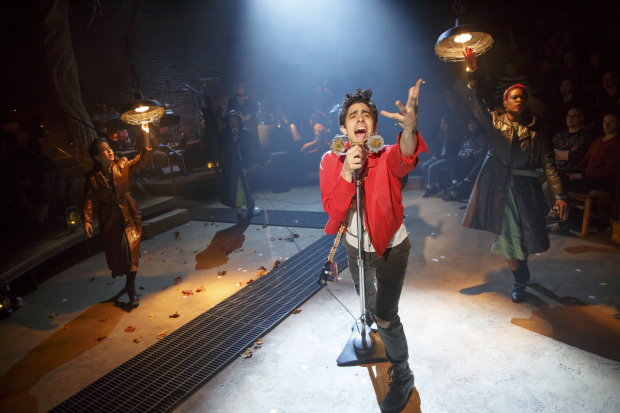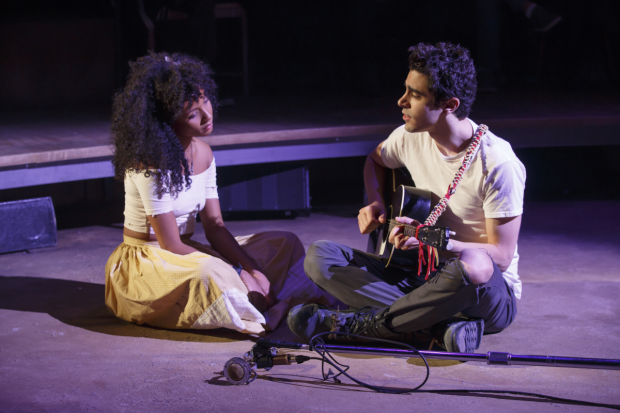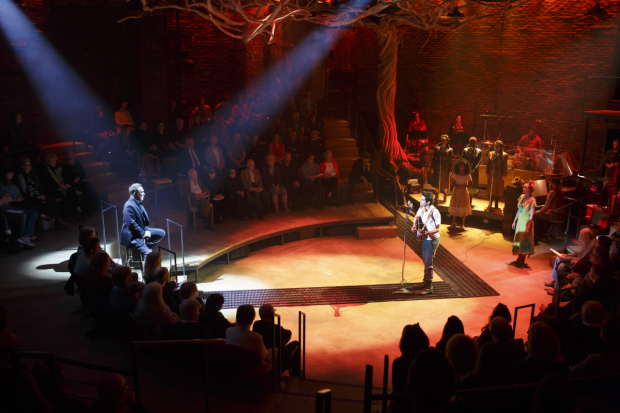Hadestown
The director of Broadway-bound ”Natasha, Pierre & the Great Comet of 1812” tackles Greek mythology in a world-premiere musical.

(© Joan Marcus)
A wall-building tycoon reigns at New York Theatre Workshop this spring. You guessed it: It's the lord of darkness himself…Hades, the antagonist of the scorching new musical Hadestown. As meaningful as it is melodic, this is a must-see for connoisseurs of innovative musical theater.
Hadestown is director Rachel Chavkin's staging of Anaïs Mitchell's 2010 concept album telling the Orpheus and Eurydice myth through American folk music. Chavkin (who will make her Broadway debut this fall with the transfer of runaway hit Natasha, Pierre & the Great Comet of 1812) has crafted a visually arresting production to match the richness of Mitchell's score. Together, they present an age-old tale that echoes eerily through our own time.
Eurydice (Nabiyah Be) is in love with Orpheus (Damon Daunno). They drink wine and frolic with the goddess Persephone (Amber Gray) in the good times, but Orpheus is a musician and winter is coming. He can't possibly hope to support Eurydice through the thin months, so she takes a job with Hades (Patrick Page), industrialist lord of the underworld and husband to Persephone. The ticket to Hadestown is one-way, but Orpheus still goes after her. Armed only with his guitar and a song, he's determined to rescue his lost love.

(© Joan Marcus)
Chavkin and Mitchell enrich this ancient story in their imaginative rendering, making the characters and their relationships seem fresh and relatable: Hades and Persephone are an old married couple, their initial spark of love clouded by accumulated wealth and power. Conversely, Orpheus and Eurydice are young and perhaps a little foolishly quixotic. We feel twinges of recognition from our own lives throughout this two-hour affair.
By telling an ancient Greek myth through a more contemporary American musical form, Mitchell also raises questions around the sale of labor in an industrial economy: Are we really "free" when all of our time is devoted to work? While the economics of Hadestown are not precisely applicable to our own time (certainly, many Rust Belt Americans would much rather toil in Hades' foundry than drift through retail purgatory), the feelings of despair and injustice at the core of this play seem drawn directly from the front page of the newspaper.
The first act finale, "Why We Build the Wall," is particularly chilling in its prescience: It's a call-and-response in which Hades, Big Brother-like, preaches about the necessity of a wall around Hadestown:
Who do we call the enemy?
The enemy is poverty
And the wall keeps out the enemy
And we build the wall to keep us free
That's why we build the wall
We build the wall to keep us free.
Amazingly, those are the exact same lyrics that appeared on the 2010 concept album.
One of the great stage villains of our era, Page is magnificent as the authoritarian plutocrat. He exudes power with his confident gait and resonant bass, shielding his eyes from the flames of hell with a very cool pair of sunglasses. As Persephone, Gray wows us with her vocal dexterity. The two really feel like a couple that has been married since the dawn of time.
Their foils are just as credible: Be is doe-eyed and innocent as Eurydice. Daunno is a teen heartthrob with an uncommonly muscular falsetto. He reaches for (and hits) the highest notes, and we understand why Eurydice fell for him.

(© Joan Marcus)
From Orpheus' stratospheric heights to Hades' subterranean lows, Hadestown is vocally very difficult, especially for a work of musical theater. Under the careful music direction of Liam Robinson, this eight-person cast rises to the challenge. The three fates (Lulu Fall, Jessie Shelton, and Shaina Taub) sing continuously, often in three-part harmony, and sometimes a cappella. Their blending is seamless. As our narrator, Hermes, Chris Sullivan seems drawn from the French quarter of New Orleans: He soulfully growls his rhyming couplets as he dances around the room.
Chavkin and scenic designer Rachel Hauck have transformed New York Theatre Workshop into an arena. We sit in mismatched wooden chairs, filling the role of the workers of Hadestown. Michael Krass gives a lesson in thrift with his less-is-more costumes, employing iconic items for each character (a flower in Persephone's hair, a simple white T-shirt for Orpheus) to make a lasting impression. Similarly, props designer Noah Mease and lighting designer Bradley King create Orpheus' perilous escape from the underworld using just a grate and a concentrated spot. Sound designer Robert Kaplowitz artfully distorts the actors' voices, deepening Hades to make him more malevolent and filtering Hermes through what sounds like an a prison P.A. system.
Everything about Hadestown is designed to grab your attention and pull you into the story. Even if you are not a fan of folk music, it will be difficult to resist this tuneful and visually spectacular production.









